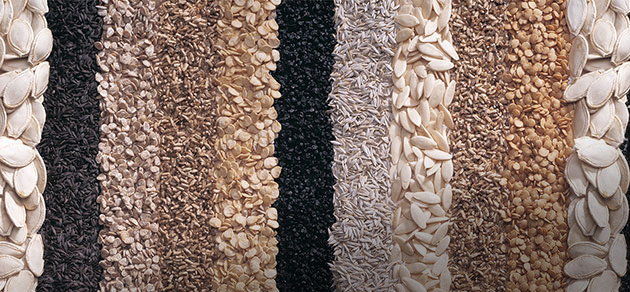
About Our Seeds
For over 50 years Johnny's Selected Seeds has been helping families and friends to feed one another. Everything we do here is focused on helping you have a successful growing experience. We understand that putting the seeds in the ground is but a small part of your total investment of time, energy, and money. When you buy from Johnny's, you can be confident that the seeds you are planting are fresh, vital, and of superior quality. We guarantee it.
About Our Seed Safety
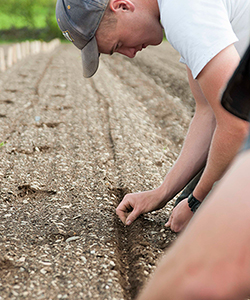
Johnny's does not knowingly sell genetically modified seeds; nor do we breed new varieties using genetic engineering. Our breeders use traditional, painstaking methods of natural crossing to create hybrid seeds that are healthy and safe.
We are proud to be one of the nine original signers of the Safe Seed Pledge:
Agriculture and seeds provide the basis upon which our lives depend. We must protect this foundation as a safe and genetically stable source for future generations. For the benefit of all farmers, gardeners, and consumers who want an alternative, we pledge that we do not knowingly buy or sell genetically-engineered seeds or plants. The mechanical transfer of genetic material outside of natural reproductive methods and between genera, families, or kingdoms, poses great biological risks as well as economic, political, and cultural threats. We feel that genetically engineered varieties have been insufficiently tested prior to public release. More research and testing are necessary to further assess the potential risks of genetically-engineered seeds. Further, we wish to support agricultural progress that leads to healthier soils, genetically diverse agricultural ecosystems, and, ultimately, healthy people and communities.
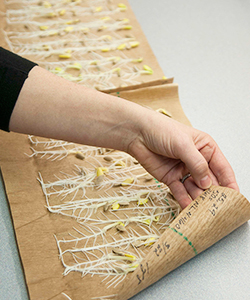
We partner only with certified industry seed labs for both our initial and regular cycle germination tests as per Federal Seed Act requirements. Johnny's sets and maintains minimum germination requirements that consistently exceed Federal Seed Act minimum requirements.
Pathology tests are completed only at certified outside labs following industry standards.
All labs performing germination and purity tests on Johnny's seed lots follow current Association of Official Seed Analysts rules for all crops.
To ensure that our seed germination rates remain optimal, we store our seed in a climate-controlled environment.
Our Quality Assurance Department will only release seed lots that meet our stringent requirements.
Types of Seed We Offer
Certified Organic Seeds
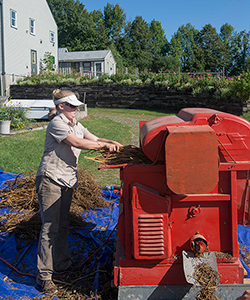
Seeds designated by the OG symbol are harvested from plants grown under the strict guidelines required by the USDA's National Organic Program (NOP), and more specifically the laws enacted by the Code of Federal Regulations. Organic certifying agencies are the vehicle for ensuring that farms/growers wishing to become and remain certified — including Johnny's Selected Seeds as a certified seed producer and handler — meet and follow these guidelines.
To be labeled as certified organic, seeds must have been grown, harvested, stored, and handled in accord with the rules and procedures outlined by the NOP. Certified organic seeds cannot contain genetically-engineered traits; must be grown under certified organic conditions using only those inputs — eg, fertilizer, weed, and pest controls — allowable in organic agriculture; and packed in a certified facility.
Johnny's has been farming organically for over 45 years, and we have been a MOFGA-Certified Organic Seed Handler since 1979. We offer hundreds of varieties of certified organic vegetable, herb, flower, fruit, and farm seeds allowable for certified organic production, and remain true to our commitment to diversify our certified organic seed offerings.
All Certified Organic seeds are designated by an OG in the product name.
Certified Naturally Grown Seeds & Farm Products
Certified Naturally Grown seeds and other farm products are verified to meet high standards for ecological production through a peer review process. All standards are detailed at naturallygrown.org.
Hybrid Seed
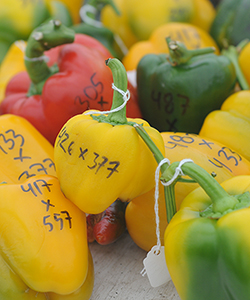
F1 Hybrid seeds are the result of a cross between two genetically distinct parent plant lines. The plants grown from these seeds will usually show more vigor than either of the two parent plants, and often more vigor and uniformity than similar non-hybrid (standard) varieties. To create a hybrid (F1), traditional breeding methods are used that involve the cross-pollination of two parent varieties that were selected for specific traits.
Commercially, hybrid seed must be produced by the seed producer each year by crossing the inbred parents. Inbred parents are used because they express characteristics uniformly, and this uniformity is also seen in the F1 hybrid plants — F1 referring to "first filial" or first generation after the cross.
Natural crossing in the field may also result in useful hybrids. However, the F2 or second generation after the cross, grown from seeds saved from F1 hybrid plants, will not be uniform, and in fact often will have numerous different types as a result of genetic segregation.
Johnny's hybrid varieties are selected for improved flavor, disease resistance, and climate adaptability. We offer numerous F1 hybrids.
All Hybrid seeds are designated by an (F1) in the product name.
Open-Pollinated & Heirloom Seeds
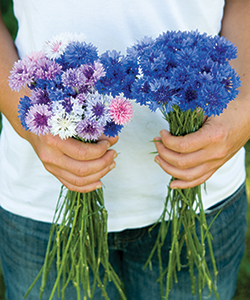
We also offer hundreds of Open-Pollinated (OP) varieties, which are the varieties of plants that reproduce themselves naturally, through either a) cross-pollination (between separate individual plants of the same species and variety via wind, insects, water) or b) self-pollination (between male and female flower parts within the same flower or between separate flowers on the same plant). As long as they are grown isolated at a sufficient distance from crops of the same species but of a different variety/ies, the offspring plants grown from seeds collected from them will continue to demonstrate relatively stable traits from one generation to the next.
Among older open-pollinated strains are the varieties we have come to regard as Heirlooms — carefully selected varieties whose seed lines have been maintained and passed down over generations.
While the plants of open-pollinated varieties in general are fairly similar to one another, they are not as uniform as those of hybrids, and there can be a tremendous amount of genetic variability among the strains of the same open-pollinated variety. For this reason, our Open-Pollinated Project involves growing-out and carefully evaluating distinctive strains of numerous open-pollinated and heirloom varieties every season, to select and offer only the most reliable, best-tasting, most fragrant, or attractive strains of these varieties.
In addition, organic seeds are available for most of the open-pollinated and heirloom varieties we offer.
The majority of our seeds are untreated and uncoated, and all our seeds are neonicotinoid-free.
There are 3 main types of seed enhancements Johnny's regularly features: Treatments, also known as "Actives"; Coatings, which include Film-Coating as well as Pelleting; and Priming. These are described in more detail below.
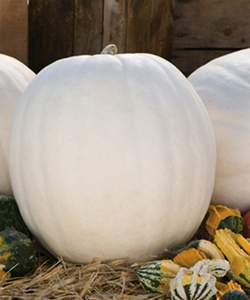
Treated Seeds (Actives)
Treated seeds have been coated with a fungicidal treatment that protects the seeds from soilborne pests or pathogens during the seeding and germination phases. All our treated seeds are neonicotinoid-free.
Note: The seeds themselves should not be used for food, feed, or oil purposes.
All seed products that have been Treated are denoted by a T in the part numbers.
Film-Coated Seeds
Film Coating is another type of seed enhancement that facilitates ease of sowing. Film coating may be useful to increase seed flowability through better "slippage" between individual seeds; make the seeds easier to see as they are being handled or once placed in growing medium; assist with seed identification; and/or decrease dust in planting conditions. With film-coated seeds, certified organic growers should check suitability of the film coating with their certifier.
Some, though not all of our Film-Coated seed products are designated by an FC in their part numbers. If seeds are offered with an NOP-compliant film coating, it is not noted in the part numbers.
Pelleted Seeds
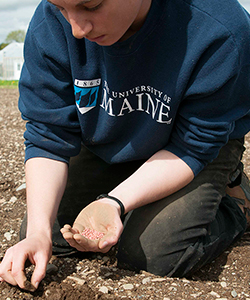
Pelleting is an enhancement that coats the seeds with inert substances that render them uniform in size and shape. The pellet coating serves to improve seed visibility, handling, and sowing accuracy at uniform distances (singulation), thereby reducing seed waste and the need for thinning.
We have recently introduced multi-seed pellets for certain varieties. As the name suggests, there is more than one seed (generally 4–5) in each pellet, which makes the multi-seed pellet ideal for retail container or hydroponic production. In place of sowing several seeds per container or growing-media cube, just one pellet is sown, saving labor time and expense. These are conventional pellets and are not approved for use on certified-organic farms.
Conventional seed with Conventional Pelleting is designated by P in the product number.
Conventional seed with NOP-Compliant Pelleting is designated by JP.
Certified Organic seed with NOP-Compliant Pelleting is designated by GP.
Primed Seeds
Priming is a seed enhancement used to improve germination speed and seedling uniformity, or to break the dormancy of the seeds. Priming can be offered alone, or in combination with pelleting.
The process of priming involves hydrating seeds in a solution within a controlled environment, allowing the initial phase of germination to take place, then arresting the process at a certain point, at which time the seeds are dried down to moisture levels conducive to storage. The materials used in the germination solution, usually salts to control water uptake by the seeds, dictate whether the priming process can be certified as organic.
Currently, we offer two primed varieties, both conventional: Primed Rosemary and 'Maxifort' tomato. Pelleted lettuce is also sometimes, but not always primed, a characteristic that varies from seed lot to seed lot. Our certified-organic seed is primed using when the process is necessary, and using only certified-organic priming methods.
Because primed seeds are sold in a germination-ready state, we recommend purchasing only enough primed seeds for your current growing cycle.

